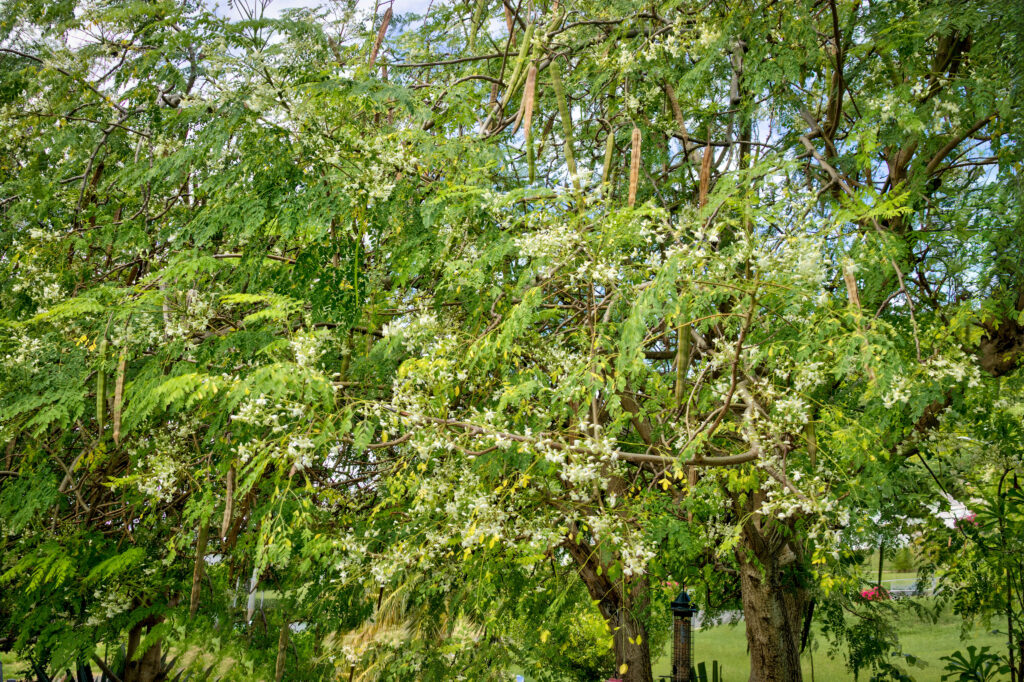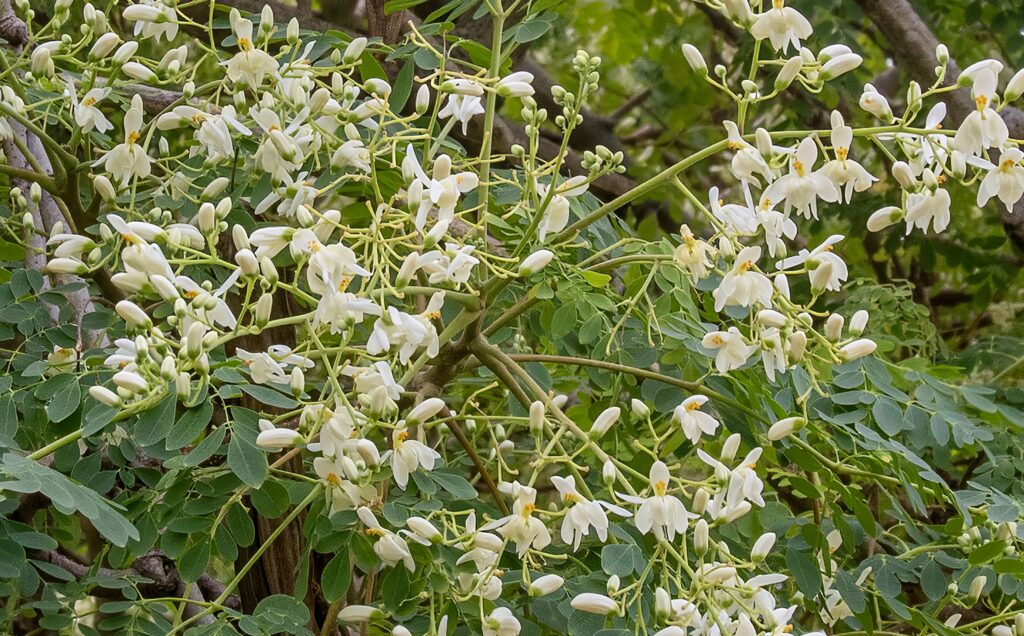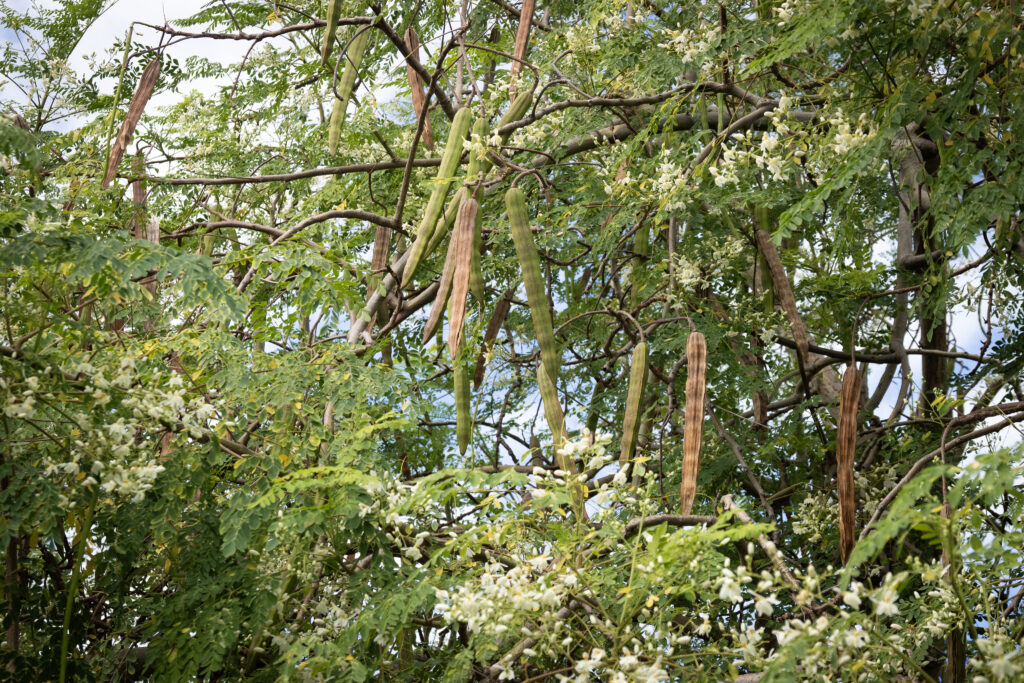Moringa Tree
Moringa oleifera
Moringa is drought-resistant and can grow in poor soil, which makes it well-suited for St. Croix’s conditions. The leaves are rich in vitamins, minerals, and protein, often used in local health remedies or incorporated into diets. In St. Croix, as in other parts of the Caribbean, Moringa is gaining popularity for its superfood status, used in teas, powders, and herbal medicine. It grows quickly and requires little maintenance, making it a practical addition to home gardens, farms, and reforestation efforts.
Moringa was brought to the Caribbean through trade and colonization. It is now naturalized in many areas and grows well in the region. While it is not native, Moringa is not generally considered invasive because it does not aggressively displace native flora. It is primarily cultivated by humans.
Moringa (Moringa oleifera), often referred to as the “drumstick tree” or “miracle tree,” is highly valued in traditional medicine for its diverse health benefits. Almost every part of the tree—leaves, seeds, pods, flowers, and roots—has medicinal properties.
Here are the notable medical uses of Moringa:
1. Nutritional Benefits
Moringa is a rich source of vitamins, minerals, and antioxidants. It is especially high in:
- Vitamin C, A, and E
- Calcium, potassium, and magnesium
- Protein and essential amino acids
Its nutritional density makes it useful in combating malnutrition and improving overall health, particularly in developing regions.
2. Anti-Inflammatory Properties
- Uses: Moringa contains compounds like isothiocyanates and flavonoids that reduce inflammation.
- Applications:
- Helps manage chronic inflammatory conditions such as arthritis and asthma.
- May alleviate inflammation-related disorders like inflammatory bowel disease (IBD).
3. Antioxidant Effects
- Uses: Its leaves are rich in antioxidants like quercetin, chlorogenic acid, and beta-carotene.
- Applications:
- Protects cells from oxidative stress, reducing the risk of chronic diseases like cancer and cardiovascular disorders.
- Supports skin health and reduces signs of aging.
4. Diabetes Management
- Uses: Moringa helps lower blood sugar levels due to compounds like isothiocyanates.
- Applications:
- Improves insulin sensitivity and regulates glucose levels.
- Can be used as a complementary therapy for type 2 diabetes.
5. Heart Health
- Uses: Moringa has cholesterol-lowering and blood pressure-regulating properties.
- Applications:
- Reduces bad cholesterol (LDL) levels and promotes heart health.
- Prevents plaque formation in arteries, reducing the risk of atherosclerosis and stroke.
6. Antimicrobial and Antibacterial Properties
- Uses: Moringa exhibits antimicrobial activity against bacteria, fungi, and viruses.
- Applications:
- Treats minor infections, such as urinary tract infections (UTIs) and wounds.
- Supports oral health by combating bacteria that cause dental cavities and gum disease.
7. Immune System Booster
- Uses: Its high vitamin C content and other bioactive compounds strengthen immunity.
- Applications:
- Aids in preventing colds, flu, and other infections.
- Beneficial for immune-compromised individuals.
8. Digestive Health
- Uses: Moringa contains dietary fiber and compounds that support gut health.
- Applications:
- Relieves constipation and supports healthy digestion.
- Acts as a natural detoxifier, helping cleanse the liver and kidneys.
9. Anemia Treatment
- Uses: High iron content makes moringa effective in treating anemia.
- Applications:
- Boosts hemoglobin levels in blood.
- Helps manage symptoms of fatigue and weakness associated with iron deficiency.
10. Lactation Support
- Uses: Moringa is a galactagogue (milk-promoting agent).
- Applications:
- Enhances breast milk production in lactating mothers.
- Provides essential nutrients for both mother and baby.
11. Anticancer Properties
- Uses: Contains compounds like niazimicin that exhibit anticancer potential.
- Applications:
- May inhibit cancer cell growth and protect healthy cells.
- Used in traditional medicine for cancer prevention and adjunctive treatment.
12. Skin and Hair Health
- Uses: Rich in vitamins and antibacterial properties.
- Applications:
- Helps treat acne and minor skin infections.
- Promotes hair growth and reduces scalp issues like dandruff.
13. Hormonal Balance
- Uses: Regulates hormonal levels due to its isothiocyanate content.
- Applications:
- Alleviates symptoms of menopause and menstrual irregularities.
- May support thyroid function.
14. Mental Health and Neuroprotection
- Uses: Antioxidants and amino acids in moringa promote brain health.
- Applications:
- May alleviate anxiety and depression.
- Supports cognitive function and protects against neurodegenerative diseases like Alzheimer’s.
15. Wound Healing
- Uses: Leaves and seeds have wound-healing and anti-inflammatory properties.
- Applications:
- Accelerates wound healing when applied topically.
- Reduces swelling and pain.
How to Use Moringa Medicinally
- Leaves: Consumed fresh, dried, or as powder in smoothies, soups, or teas.
- Seeds: Used for oil extraction or eaten raw for detoxification.
- Pods: Cooked and eaten as a vegetable.
- Flowers: Brewed into teas or added to dishes.
- Extracts: Capsules, oils, or tinctures available for concentrated benefits.
Cautions and Side Effects
- Avoid high doses, as it may cause stomach upset or diarrhea.
- Pregnant women should consult a doctor before use, as it may have uterine-stimulating effects.
- Ensure the source is free of contaminants to avoid heavy metal exposure.
Moringa’s versatility makes it a powerful natural remedy.


